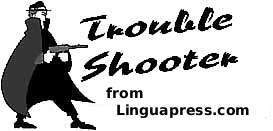
Explaining the everyday words and English grammar points that can cause most confusion
Hyphens in English
When are hyphens needed ?
To hyphenate or not to hyphenate? That is the question.
"Do I need a hyphen (that is a small dash - ) in the middle of this word? "It's the sort of question that learners often ask. But be reassured; native English speakers often ask the same question. And no wonder !
Good question ! The problem is that in this example there is no real answer !
- The Oxford English Dictionary says news-stand
- The Cambridge English dictionary says newsstand
- And there are plenty of examples in books and online, where the word is written as two words..
If only all English grammar rules were so flexible !! Unfortunately they are not.
Nevertheless, there are some "rules", or more exactly "principles" or "guidelines" that can help us know when to join words, when to use a hyphen, or when to keep words separate.
Some principles to follow
1. Avoid ambiguity
A building made mostly of glass, and used by gardeners to keep plants warm, is known as a greenhouse or sometimes a green-house, but never a green house By joining the words together or using a hyphen, we avoid confusion or ambiguity. A. green house is something quite different; it is a house painted green.Here are some pairs of words and expressions, where the addition of a hyphen serves to avoid ambiguity :
- re-cover and recover
- re-creation and recreation
- fifty one-month-old
chickens are one less than
fifty-one month-old chickens and not at all the same as
fifty-one-month-old chickens which would actually be old hens - little-loved children are not the same as little loved children
- these ten-pound notes are not the same as these ten pound-notes
- many-coloured dresses are not the same as many coloured dresses
- a man-eating tiger is not the same as a man eating tiger
- English-language
students are not necessarily the same as
English language students
2. Hyphenate some compound adjectives
Compound adjectives (adjectives where two or more words have a single combined meaning), are usually hyphenated when used attributively (i.e. before a noun). Here are some more examples- A back-breaking job
- A twin-engined aeroplane
- An English-speaking friend
- A celebrity-studded show
- A round-the-world race
- A mass-market product
- A state-of-the-art innovation
- A gluten-free diet
- An open-ended story
- A born-again President
- a rapidly changing situation
- a recently elected president
- a newly appointed secretary
- a wholly inappropriate remark
- The job is back breaking.
- The story was open ended.
3. Hyphens in numbers
Hyphens are generally used in numbers between 21 and 99 (except for numbers ending in 0)- Twenty-seven
- A hundred and fifty-six
- Eighty-five thousand four hundred and forty-four
4. Nouns or adjectives formed from phrasal or prepositional verbs
While we do not use hyphens in phrasal or prepositional verbs, the words are normally either joined together or hyphenated when used as a noun.- To break down > a breakdown
- To make up > makeup
- To take over > a takeover
- To take away > a takeaway restaurant
- To melt down > a meltdown
- To cover up > a cover-up
- To drive through > a drive-through restaurant
- To lie in > a lie-in
- To break through > a breakthrough
- To build up > a build-up
5. Compound nouns
We are back to the question of news stand, news-stand or newsstand ?Basically there is no rule here. In most cases, the writer has a choice; but not always. Some compound nouns are (almost) always written with a hyphen, others as two separate words, and others still as a single word.
One would (almost) always write lifestyle or typewriter or timetable or tablecloth as one word, but baby-boomer and car-ferry with a hyphen, and corner shop or music festival each as two words.
For most words, there is a degree of choice; but some words just have to be learned !
Copyright : Website and texts © Linguapress.com except where otherwise indicated
Return to Linguapress home page



 Copyright
information.
Copyright
information.